

Participation in Initiatives and Reference Guidelines
The significance of taking part in, and supporting initiatives in Japan and overseas
The term "initiative" means taking a leading role, and refers to companies' principles and codes of conduct. SMBC Group supports a range of initiatives in Japan and overseas, such as the United Nations Global Compact.
Seamless cooperation between various organizations is essential to solve problems on a global scale and create a sustainable society. SMBC Group believes in the importance of participating in these initiatives in Japan and overseas, and remains committed to furthering SMBC Group’s sustainability objectives in light of these initiatives, pursuant to applicable laws and our independent credit decision, to evaluate the environmental and social impact of any project or transaction. Mindful of the social impact as a financial institution, SMBC Group declares such intentions to the society by taking part in these initiatives, and will take an active role as a member of the global community.
Particularly concerning climate change issues, we are committed to achieving net zero emissions across our overall investment and loan portfolio by 2050, in addition to achieving net zero emissions in our groupwide operation by 2030. In light of these commitments, we are participating in the discussions of the workstreams in “Glasgow Financial Alliance for Net-Zero”, and to drive forward our efforts to realize our net zero targets, we are also participating in the “Taskforce on Scaling Voluntary Carbon Markets (TSVCM)” and the “Partnership for Carbon Accounting Financials (PCAF)”. Particularly, in the GFANZ, we are a member of several workstreams and are involved in the discussions of making suggestions to the industry regarding net zero transition as the finance sector, and in the enhancement of transition finance, etc. In the PCAF, we are contributing to the discussions to elaborate calculation methods of Financed Emissions. As such, by actively participating in these global initiatives, we are striving to realize a decarbonized society.
Moreover, Sumitomo Mitsui Banking Corporation (SMBC), the core banking subsidiary of SMBC Group, is a member of the Japanese Bankers Association (JBA). In December 2021, JBA introduced the “Carbon Neutrality Initiative (CNI)” to enhance such activities as the banking industry in Japan. SMBC performed a leading role in developing the CNI as the chair bank of the association at the time.
SMBC Group will further enhance its activities towards the achievement of the net zero target and contribute to leading the realization of a decarbonized society by actively being a part of discussions concerning climate change both domestically and globally.
Initiatives supported by the SMBC Group
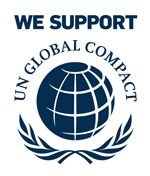
United Nations Global Compact
Ten principles proposed by the United Nations concerning human rights, labor, environment and corruption prevention.
- Human Rights
-
-
Principle 1:
Businesses should support and respect the protection of internationally proclaimed human rights; and -
Principle 2:
make sure that they are not complicit in human rights abuses.
-
Principle 1:
- Labour
-
-
Principle 3:
Businesses should uphold the freedom of association and the effective recognition of the right to collective bargaining; -
Principle 4:
the elimination of all forms of forced and compulsory labour; -
Principle 5:
the effective abolition of child labour; and -
Principle 6:
the elimination of discrimination in respect of employment and occupation.
-
Principle 3:
- Environment
-
-
Principle 7:
Businesses should support a precautionary approach to environmental challenges; -
Principle 8:
undertake initiatives to promote greater environmental responsibility; and -
Principle 9:
encourage the development and diffusion of environmentally friendly technologies.
-
Principle 7:
- Anti-Corruption
-
-
Principle 10:
Businesses should work against corruption in all its forms, including extortion and bribery.
-
Principle 10:
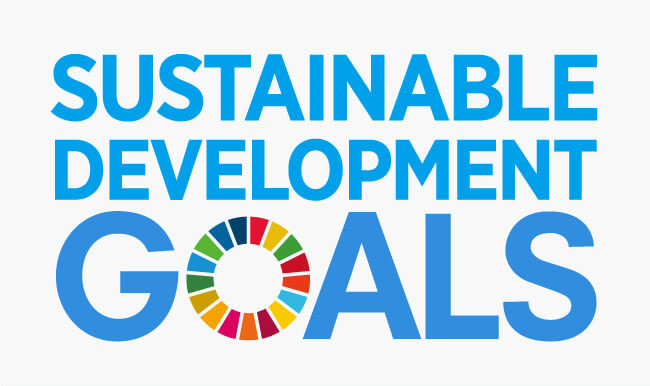
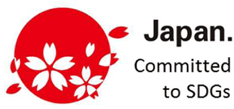
Sustainable Development Goals (SDGs)
The SDGs are a set of 17 goals and 169 targets for achieving human and global prosperity adopted at the "United Nations Sustainable Development Summit."
SMBC Group will contribute to the achievement of these goals as a member of the Global Compact Network Japan.

UNEP Finance Initiative (UNEP FI)
Organization which pursues, develops and promotes the ideal financial institutions which pay attention to the environment and sustainability.
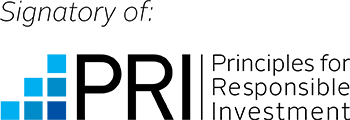
Responsible investment Principles (PRI)
The principle which is intended to improve long-term investment performance by incorporating environmental, social and corporate governance (ESG) issues into investment decision making for customers and the beneficiaries.
Announced in April 2006 by UN Secretary-General Kofi Annan (at that time).
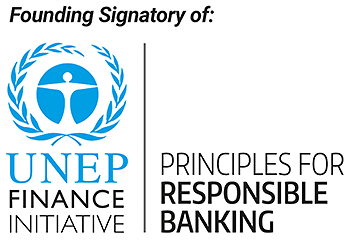
Principle of Responsible Banks (PRB)
The principle which is intended to promote transparent disclosure.
Signatories is encouraged to set goals and strategy in line with the social goals set out in the SDGs and the Paris Agreement to achieve sustainable development of society.

Task Force on Nature-Related Financial Disclosures (TNFD)
An international organization established in June 2021 to build a risk management and disclosure framework related to nature capital, inspired by the 2019 World Economic Forum (Davos Conference), companies aim to achieve “Nature-Positive” by disclosing information related to nature.
SMBC Group officially adopted TNFD recommendation in November 2023.

Partnership for Carbon Accounting Financials (PCAF)
A collaboration between financial institutions worldwide to enable harmonized assessments and disclosures of greenhouse gas emissions financed by loans and investments, launched in December 2015
SMBC Group is a member of the PCAF Japan coalition, promoting the adoption and expansion of the measurement and disclosure of greenhouse gas emissions from loans and investments by Japanese financial institutions.

CDP
Initiatives which measures, manages and reduces effects of climate changes by prompting institutional investors and business managers to have dialogues regarding such climate changes.

Poseidon Principles
A framework for integrating climate considerations into each institution’s independent lending decisions to promote international shipping’s decarbonization.
From SMBC Group, Sumitomo Mitsui Banking Corporation and Sumitomo Mitsui Finance and Leasing are signatories to the Principles.
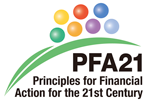
Principles for Financial Action toward a Sustainable Society (Principles for Financial Action for the 21st Century)
Aspirational principles adopted in October 2011 by and among Japanese financial institutions to expand the reach and improve the quality of environmental finance in Japan.
Principles of action for financial institutions in Japan adopted in October 2011 for the purpose of expanding and improving the quality of environmental finance.
*As of July 2020, the principles had been signed by 285 financial institutions, including companies from SMBC Group; SMBC, Sumitomo Mitsui Finance and Leasing, and SMBC Nikko Securities and Sumitomo Mitsui DS Asset Management.
Guidelines Used for Reference

SMBC Group refers to the following guidelines in its disclosure of initiatives to realize sustainability.
GRI Content Index
SMBC Group refers to the GRI Standard, a global information disclosure standard provided by the Global Reporting Initiative (GRI) to deliver reporting on the organization’s impacts to the economy, environment and society, and its contribution to a sustainable development.
The following table indicates where we disclose information that corresponds to the standard.
In principle, the reporting time frame is the same as its fiscal year (from April 2023 to March 2024), but some sections of this report may refer to outside this period.
| Standard | Disclosure | Location | |
|---|---|---|---|
| GRI2:General Disclosures 2021 | 2-1 | Organizational details | |
| 2-2 | Entities included in the organization’s sustainability reporting | ||
| 2-3 | Reporting period, frequency and contact point | ||
| 2-4 | Restatements of information | ||
| 2-5 | External assurance | - | |
| 2-6 | Activities, value chain and other business relationships | ||
| 2-7 | Employees | ||
| 2-8 | Workers who are not employees | - | |
| 2-9 | Governance structure and composition | ||
| 2-10 | Nomination and selection of the highest governance body | ||
| 2-11 | Chair of the highest governance | ||
| 2-12 | Role of the highest governance body in overseeing the management of impacts | ||
| 2-13 | Delegation of responsibility for managing impacts |
|
|
| 2-14 | Role of the highest governance body in sustainability reporting | - | |
| 2-15 | Conflicts of interest | ||
| 2-16 | Communication of critical concerns | ||
| 2-17 | Collective knowledge of the highest governance body | ||
| 2-18 | Evaluation of the performance of the highest governance body | ||
| 2-19 | Remuneration policies | ||
| 2-20 | Process to determine remuneration | ||
| 2-21 | Annual total compensation ratio | - | |
| 2-22 | Statement on sustainable development strategy | ||
| 2-23 | Policy commitments | ||
| 2-24 | Embedding policy commitments | ||
| 2-25 | Processes to remediate negative impacts | ||
| 2-26 | Mechanisms for seeking advice and raising concerns | ||
| 2-27 | Compliance with laws and regulations | ||
| 2-28 | Membership associations | ||
| 2-29 | Approach to stakeholder engagement | ||
| 2-30 | Collective bargaining agreements | ||
| GRI 3: Material Topics 2021 | 3-1 | Process to determine material topics | |
| 3-2 | List of material topics | ||
| 3-3 | Management of material topics | ||
| GRI101:Biodiversity 2024 | 101-1 | Policies to halt and reverse biodiversity loss | - |
| 101-2 | Management of biodiversity impacts | ||
| 101-3 | Access and benefit-sharing | - | |
| 101-4 | Identification of biodiversity impacts | ||
| 101-5 | Locations with biodiversity impacts | ||
| 101-6 | Direct drivers of biodiversity loss | - | |
| 101-7 | Changes to the state of biodiversity | - | |
| 101-8 | Ecosystem services | - | |
| GRI 201:Economic Performance2016 | 201-1 | Direct economic value generated and distributed | |
| 201-2 | Financial implications and other risks and opportunities due to climate change | ||
| 201-3 | Defined benefit plan obligations and other retirement plans | ||
| 201-4 | Financial assistance received from government | - | |
| GRI 202:Market Presence 2016 | 202-1 | Ratios of standard entry level wage by gender compared to local minimum wage | - |
| 202-2 | Proportion of senior management hired from the local community | ||
| GRI 203:Indirect Economic Impacts 2016 | 203-1 | Infrastructure investments and services supported | |
| 203-2 | Significant indirect economic impacts | - | |
| GRI 204: Procurement Practices 2016 | 204-1 | Proportion of spending on local suppliers | - |
| GRI 205: Anti-corruption 2016 | 205-1 | Operations assessed for risks related to corruption | |
| 205-2 | Communication and training about anti-corruption policies and procedures | ||
| 205-3 | Confirmed incidents of corruption and actions taken | ||
| GRI 206:Anti-competitive Behavior 2016 | 206-1 | Legal actions for anti-competitive behavior, anti-trust, and monopoly practices | - |
| GRI 207:Tax2019 | 207-1 | Approach to tax | |
| 207-2 | Tax governance, control, and risk management | ||
| 207-3 | Stakeholder engagement and management of concerns related to tax | ||
| 207-4 | Country-by-country reporting | ||
| GRI 301:Materials 2016 | 301-1 | Materials used by weight or volume | - |
| 301-2 | Recycled input materials used | - | |
| 301-3 | Reclaimed products and their packaging materials | - | |
| GRI 302: Energy 2016 | 302-1 | Energy consumption within the organization | |
| 302-2 | Energy consumption outside of the organization | ||
| 302-3 | Energy intensity | - | |
| 302-4 | Reduction of energy consumption | ||
| 302-5 | Reductions in energy requirements of products and services | - | |
| GRI 303:Water and Effluents 2018 | 303-1 | Interactions with water as a shared resource | - |
| 303-2 | Management of water discharge-related impacts | - | |
| 303-3 | Water withdrawal | - | |
| 303-4 | Water discharge | - | |
| 303-5 | Water consumption | ||
| GRI 305:Emissions 2016 | 305-1 | Direct (Scope 1) GHG emissions | |
| 305-2 | Energy indirect (Scope 2) GHG emissions | ||
| 305-3 | Other indirect (Scope 3) GHG emissions | ||
| 305-4 | GHG emissions intensity | ||
| 305-5 | Reduction of GHG emissions | ||
| 305-6 | Emissions of ozone-depleting substances (ODS) | - | |
| 305-7 | Nitrogen oxides (NOx), sulfur oxides (SOx), and other significant air emissions | - | |
| GRI 306:Waste2020 | 306-1 | Waste generation and significant waste-related impacts | - |
| 306-2 | Management of significant waste-related impacts | - | |
| 306-3 | Waste generated | ||
| 306-4 | Waste diverted from disposal | ||
| 306-5 | Waste directed to disposal | - | |
| GRI 308:Supplier Environmental Assessment | 308-1 | New suppliers that were screened using environmental criteria | - |
| 308-2 | Negative environmental impacts in the supply chain and actions taken | - | |
| GRI 401:Employment 2016 | 401-1 | New employee hires and employee turnover | |
| 401-2 | Labor/Management Relations 2016 | ||
| 401-3 | Parental leave | ||
| GRI 402:Labor/Management Relations 2016 | 402-1 | Minimum notice periods regarding operational changes | - |
| GRI 403:Occupational Health and Safety 2018 | 403-1 | Occupational health and safety management system | - |
| 403-2 | Hazard identification, risk assessment, and incident investigation | - | |
| 403-3 | Occupational health services | - | |
| 403-4 | Worker participation, consultation, and communication on occupational health and safety | ||
| 403-5 | Worker training on occupational health and safety | ||
| 403-6 | Promotion of worker health | ||
| 403-7 | Prevention and mitigation of occupational health and safety impacts directly linked by business relationships | - | |
| 403-8 | Workers covered by an occupational health and safety management system | - | |
| 403-9 | Work-related injuries | - | |
| 403-10 | Work-related ill health | - | |
| GRI 404:Training and Education 2016 | 404-1 | Average hours of training per year per employee | |
| 404-2 | Programs for upgrading employee skills and transition assistance programs | ||
| 404-3 | Percentage of employees receiving regular performance and career development reviews | ||
| GRI 405:Diversity and Equal Opportunity2016 | 405-1 | Diversity of governance bodies and employees | |
| 405-2 | Ratio of basic salary and remuneration of women to men | ||
| GRI 407:Freedom of Association and Collective Bargaining 2016 | 407-1 | Operations and suppliers in which the right to freedom of association and collective bargaining may be at risk | - |
| GRI 408:Child Labor 2016 | 408-1 | Operations and suppliers at significant risk for incidents of child labor | |
| GRI 409:Forced or Compulsory Labor 2016 | 409-1 | Operations and suppliers at significant risk for incidents of forced or compulsory labor | |
| GRI 410:Security Practices 2016 | 410-1 | Security personnel trained in human rights policies or procedures | - |
| GRI 411:Rights of Indigenous Peoples 2016 | 411-1 | Incidents of violations involving rights of indigenous peoples | - |
| GRI 413:Local Communities 2016 | 413-1 | Operations with local community engagement, impact assessments, and development programs | |
| 413-2 | Operations with significant actual and potential negative impacts on local communities | - | |
| GRI 414:Supplier Social Assessment 2016 | 414-1 | New suppliers that were screened using social criteria | - |
| 414-2 | Negative social impacts in the supply chain and actions taken | ||
| GRI 415:Public Policy 2016 | 415-1 | Political contributions | - |
| GRI 416:Customer Health and Safety 2016 | 416-1 | Assessment of the health and safety impacts of product and service categories | - |
| 416-2 | Incidents of non-compliance concerning the health and safety impacts of products and services | - | |
| GRI 417:Marketing and Labeling 2016 | 417-1 | Requirements for product and service information and labeling | - |
SASB Standard
SMBC Group refers to the SASB Standard, a global information disclosure standard issued by the U.S. Sustainability Accounting Standards Board (SASB) in December 2023.
The following table indicates where we disclose information that corresponds to the standard for Commercial Banks (FN-CB) and Investment Banking & Brokerage (FN-IB).
| Sector | Topic | Code | Metric | Location |
|---|---|---|---|---|
| CB | Data Security | FN-CB-230a.1 | (1) Number of data breaches(2) percentage that are personal data breaches,(3) number of account holders affected | - |
| CB | FN-CB-230a.2 | Description of approach to identifying and addressing data security risks | ||
| CB | Financial Inclusion & Capacity Building | FN-CB-240a.1 | (1) Number and (2) amount of loans outstanding that qualify for programmes designed to promote small business and community development |
|
| CB | FN-CB-240a.2 | (1) Number and (2) amount of past due and nonaccrual loans or loans subject to forbearance that qualify for programmes designed to promote small business and community development | - | |
| CB | FN-CB-240a.3 | Number of no-cost retail checking accounts provided to previously unbanked or underbanked customers | ||
| CB | FN-CB-240a.4 | Number of participants in financial literacy initiatives for unbanked, underbanked, or underserved customers | ||
| IB | Incorporation of Environmental,Social, and Governance Factors in Credit Analysis | FN-IB-410a.1 | Revenue from (1) underwriting, (2) advisory, and (3) securitization transactions incorporating integration of environmental, social, and governance (ESG) factors, by industry | |
| IB | FN-IB-410a.2 | (1) Number and (2) total value of investments and loans incorporating integration of | ||
| CB/IB | FN-CB-410b.2 | Description of approach to incorporation of environmental, social, and governance (ESG) factors in credit analysis | ||
| CB | Financed Emissions | FN-CB-410b.1 | Absolute gross financed emissions,disaggregated by (1) Scope 1, (2) Scope 2 and (3) Scope 3 | |
| CB | FN-CB-410b.2 | Gross exposure for each industry by asset class | ||
| CB | FN-CB-410b.3 | Percentage of gross exposure included in the financed emissions calculation | ||
| CB | FN-CB-410b.4 | Description of the methodology used to calculate financed emissions | ||
| CB/IB | Business Ethics | FN-CB-510a.1 | Total amount of monetary losses as a result of legal proceedings associated with fraud, insider trading, anti-trust, anti-competitive behavior, market manipulation, malpractice, or other related financial industry laws or regulations | |
| CB/IB | FN-CB-510a.2 | Description of whistleblower policies and procedures | ||
| CB/IB | Systemic Risk Management | FN-CB-550a.1 | Global Systemically Important Bank (G-SIB) score, by category | - |
| CB/IB | FN-CB-550a.2 | Description of approach to integrate results of mandatory and voluntary stress tests into capital adequacy planning, longterm corporate strategy, and other business activities | ||
| IB | EmployeeDiversity & Inclusion | FN-IB-330a.1 | Percentage of (1) gender and (2) diversity group representation for (a) executive management, (b) non-executive management, (c) professionals, and (d) all other employees | |
| IB | Professional Integrity | FN-IB-510b.1 | (1) Number and (2) percentage of licensed employees and identified decision-makers with a record of investment-related investigations, consumer-initiated complaints, private civil litigations, or other regulatory proceedings | - |
| IB | FN-IB-510b.2 | Number of mediation and arbitration cases associated with professional integrity, including duty of care, by party | - | |
| IB | FN-IB-510b.3 | Total amount of monetary losses as a result of legal proceedings associated with professional integrity, including duty of care | - | |
| IB | FN-IB-510b.4 | Description of approach to ensuring professional integrity, including duty of care | ||
| IB | Employee Incentives & Risk Taking | FN-IB-550b.1 | Percentage of total remuneration that is variable for Material Risk Takers (MRTs) | - |
| IB | FN-IB-550b.2 | Percentage of variable remuneration of Material Risk Takers (MRTs) to which malus or clawback provisions were applied | - | |
| IB | FN-IB-550b.3 | Discussion of policies around supervision, control, and validation of traders’ pricing of Level 3 assets and liabilities | - | |
| CB | Activity Metrics | FN-CB-000.A | (1) Number and (2) value of checking and savings accounts by segment: (a) personal and (b) small business | |
| CB | FN-CB-000.B | (1) Number and (2) value of checking and savings accounts by segment: (a) personal and (b) small business | ||
| IB | FN-IB-000.A | (1) Number and (2) value of (a) underwriting, (b) advisory, and (c)securitization transactions | - | |
| IB | FN-IB-000.B | (1) Number and (2) value of proprietary investments and loans by sector | ||
| IB | FN-IB-000.C | (1) Number and (2) value of market making transactions in (a) fixed income, (b) equity, (c) currency, (d) derivatives, and (e) commodity products |
Stakeholder Capitalism Metrics
In September 2020, the World Economic Forum (WEF) published a report through the International Business Council (IBC), a subordinate community of business leaders within the forum, entitled “Measuring Stakeholder Capitalism: Towards Common Metrics and Consistent Reporting of Sustainable Value Creation”, where a corporate reporting framework for non-financial information is outlined. The recommended metrics are organized under four pillars that are aligned with the SDGs and principal ESG domains: Principles of Governance, Planet, People and Prosperity.
SMBC Group has been a proactive member in the process of developing the metrics by the IBC. The following table indicates where in our report we disclose information that corresponds to each of the IBC metrics.
| Theme | Core metrics | Reference |
|---|---|---|
| Governing purpose | Setting purpose | |
| Quality of governing body | Governance body composition |
|
| Stakeholder engagement | Material issues impacting stakeholders | |
| Ethical behaviour | Anti-corruption | |
| Protected ethics advice and reporting mechanisms | ||
| Risk and opportunity oversight | Integrating risk and opportunity into business process |
| Theme | Core metrics | Reference |
|---|---|---|
| Climate change | Greenhouse gas (GHG) emissions | |
| TCFD implementation | ||
| Nature loss | Land use and ecological sensitivity | |
| Freshwater availability | Water consumption and withdrawal in water-stressed areas |
|
| Theme | Core metrics | Reference |
|---|---|---|
| Dignity and equality | Diversity and inclusion | |
| Pay equality | ||
| Wage level | - | |
| Risk for incidents of child, forced or compulsory labour | ||
| Health andwell-being | Health and safety | |
| Skills for the future | Training provided |
| Theme | Core metrics | Reference |
|---|---|---|
| Employment and wealth generation | Absolute number and rate of employment | |
| Economic contribution |
|
|
| Financial investment contribution | ||
| Innovation of better products and services | Total R&D expenses | Not applicable |
| Community and social vitality | Total tax paid |